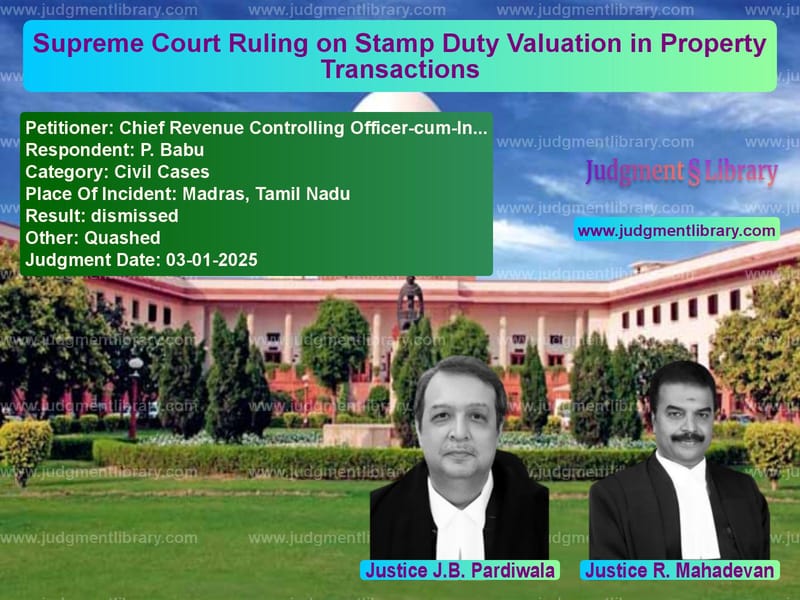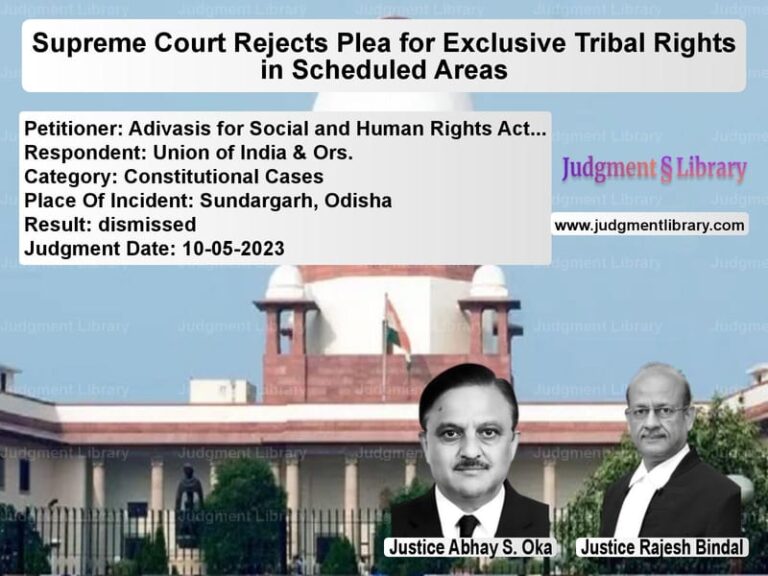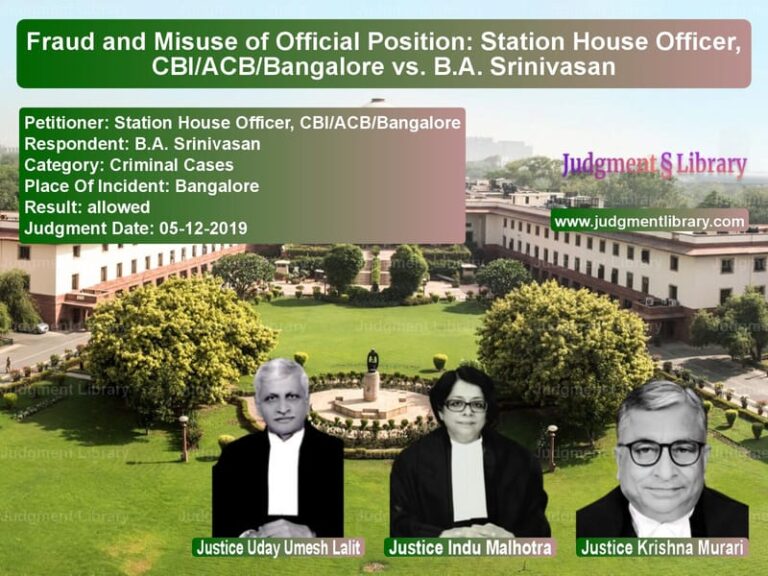Supreme Court Ruling on Stamp Duty Valuation in Property Transactions
The Supreme Court of India recently ruled on the legal validity of stamp duty assessments in property transactions in the case of Chief Revenue Controlling Officer-cum-Inspector General of Registration v. P. Babu. The case revolved around the application of Section 47-A of the Indian Stamp Act, 1899, specifically regarding the determination of the correct market value of properties involved in two sale deeds executed in 2002. The appeal was filed by the Chief Revenue Controlling Officer, who sought to challenge the Madras High Court’s decision to quash the assessment of stamp duty based on undervaluation of properties.
The issue stemmed from two sale deeds executed for properties located in the Tindivanam area, with a total sale consideration of Rs. 1,20,000/- and Rs. 1,30,000/-. The Joint Sub-Registrar had referred these documents to the Special Deputy Collector (Stamps) on the grounds of undervaluation, and the Special Deputy Collector had revised the market value substantially. The respondent, P. Babu, dissatisfied with this decision, approached the High Court. The High Court ruled in favor of the respondent, quashing the increased valuation and stamp duty assessment. The appellants then appealed to the Supreme Court.
Background of the Case
The respondent, P. Babu, had purchased two properties in Tindivanam in 2002 for Rs. 1,20,000/- and Rs. 1,30,000/- respectively. These sales were initially registered by the Joint Sub-Registrar, but the registration was delayed due to a perceived undervaluation of the properties. The Joint Sub-Registrar referred the case to the Special Deputy Collector (Stamps) for further inquiry under Section 47-A of the Indian Stamp Act, which governs the assessment of market value for the purpose of stamp duty.
The Special Deputy Collector concluded that the properties were undervalued and issued a revised market value of Rs. 45,66,660/- for one property and Rs. 12,94,900/- for the other. This substantial increase led to the demand for additional stamp duty. Dissatisfied with this assessment, the respondent challenged the decision in the High Court, arguing that the authorities had not followed the necessary procedures for determining market value, including failing to record reasons for the revision and violating principles of natural justice.
Key Legal Issues
- Whether the revision of the market value and the stamp duty assessment was carried out in accordance with the procedures laid down under Section 47-A of the Indian Stamp Act.
- The legitimacy of the Special Deputy Collector’s actions in determining market value without providing adequate reasoning and failing to comply with procedural safeguards.
- The role of the Registering Officer and the Special Deputy Collector in determining the market value of property and the necessity of adhering to the statutory obligations of providing detailed justifications.
- Whether the failure to follow the procedural requirements under the Stamp Act and the related rules renders the revised assessments void.
Arguments of the Parties
Petitioner’s Arguments
The appellants, represented by Senior Counsel Mr. Sabarish Subramanian, argued the following:
- The revised valuation was based on reasonable grounds, including a local inquiry and inspection, which are valid methods for determining the market value of property.
- The Special Deputy Collector followed the prescribed procedure under Section 47-A, and the revision was necessary to ensure that stamp duty was accurately levied based on the true market value of the properties.
- The High Court’s judgment overlooked the fact that the market value needed to be adjusted according to the prevailing rates in the region, and the failure to conduct an adequate local inquiry would have allowed undervaluation to go unaddressed.
- The requirement for detailed reasons for revising the market value was procedural but did not invalidate the overall assessment of the property value.
Respondent’s Arguments
The respondent, represented by Ms. Rohini Musa, presented the following arguments:
- The Form I notices issued by the Registering Officer did not provide any clear reasons for claiming that the properties were undervalued. The lack of reasoning violated the procedural requirements set out in the Indian Stamp Act and the related rules.
- The Special Deputy Collector’s valuation lacked transparency and was based on speculative assumptions, without providing concrete evidence or documentation to support the dramatic increase in property value.
- Under Section 47-A, the onus was on the authorities to prove that the properties were undervalued and to provide specific reasons for the revision. The failure to do so rendered the assessment arbitrary and illegal.
- The respondent further argued that the demand for additional stamp duty, based on inflated property valuations, was an abuse of power and violated the principles of natural justice.
Supreme Court’s Observations
The Supreme Court, after reviewing the case and hearing the parties, made the following observations:
“The determination of the market value under Section 47-A should not be a mechanical process. It is imperative for the authorities to provide adequate reasoning for their valuation and demonstrate the basis on which the revised value is derived. The failure to comply with this requirement renders the proceedings under Section 47-A legally unsustainable.”
Read also: https://judgmentlibrary.com/supreme-court-upholds-possession-rights-in-karnataka-property-dispute/
The Court noted that while the Special Deputy Collector had undertaken a local inquiry, the manner in which the value was determined was not substantiated with adequate documentation or reasoning. Additionally, the Court observed that the Form I notice did not provide sufficient information to justify the inflated valuations of the properties, which was a violation of procedural fairness.
Final Judgment and Directions
The Supreme Court ruled in favor of the respondent and upheld the High Court’s decision. The key points of the judgment were:
- The Court quashed the revised market value assessment made by the Special Deputy Collector, ruling that it was not carried out in accordance with the procedure laid down under the Indian Stamp Act and the relevant rules.
- The Court emphasized that the failure of the authorities to record adequate reasons for their actions and the lack of a transparent inquiry process rendered the revised valuations and the demand for additional stamp duty invalid.
- The appeals filed by the Chief Revenue Controlling Officer and other appellants were dismissed, and the orders passed by the High Court were upheld.
- The Court directed that the case be remanded to the relevant authorities for fresh proceedings, with clear guidelines to ensure that future assessments are conducted in compliance with the law and with full transparency.
Implications of the Judgment
This ruling clarifies the procedural requirements for determining the market value of properties for the purpose of stamp duty assessments. It emphasizes the necessity for transparency, proper documentation, and adherence to legal standards when revising property valuations. The judgment also highlights the importance of safeguarding against arbitrary and unfair valuation processes that could unduly burden property owners with excessive duties.
Conclusion
The Supreme Court’s judgment in Chief Revenue Controlling Officer-cum-Inspector General of Registration v. P. Babu underscores the importance of following due process in tax and valuation matters. It ensures that government authorities remain accountable in their actions and that individuals are not unfairly penalized without adequate justification or transparency. The ruling sets a precedent for similar cases involving the application of the Indian Stamp Act and reinforces the need for fairness in property transactions and assessments.
Petitioner Name: Chief Revenue Controlling Officer-cum-Inspector General of Registration.Respondent Name: P. Babu.Judgment By: Justice J.B. Pardiwala, Justice R. Mahadevan.Place Of Incident: Madras, Tamil Nadu.Judgment Date: 03-01-2025.
Don’t miss out on the full details! Download the complete judgment in PDF format below and gain valuable insights instantly!
Download Judgment: chief-revenue-contro-vs-p.-babu-supreme-court-of-india-judgment-dated-03-01-2025.pdf
Directly Download Judgment: Directly download this Judgment
See all petitions in Contract Disputes
See all petitions in Property Disputes
See all petitions in Consumer Rights
See all petitions in Judgment by J.B. Pardiwala
See all petitions in Judgment by R. Mahadevan
See all petitions in dismissed
See all petitions in Quashed
See all petitions in supreme court of India judgments January 2025
See all petitions in 2025 judgments
See all posts in Civil Cases Category
See all allowed petitions in Civil Cases Category
See all Dismissed petitions in Civil Cases Category
See all partially allowed petitions in Civil Cases Category







